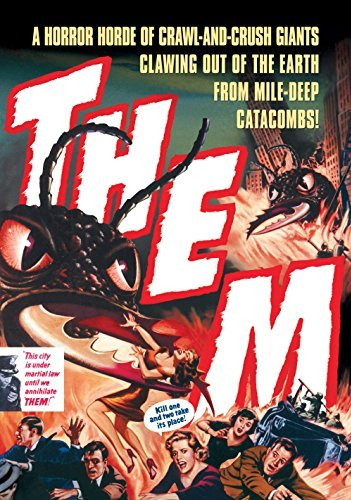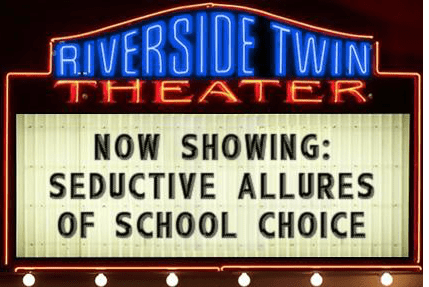School choice is so seductive. Like a chocolate cake with the double chocolate frosting. There are many forms of school choice, and the media has been telling us for a few decades now that they are all fantastic alternatives to democratically-controlled local schools. One of the most prominent of forms of choice is school vouchers.
I am a really big Sci-Fi fan. When things quiet down in the evening, I grab my remote and go searching for a streaming film. This can be quite hard nowadays because the streaming services are full of films that college students made as a class project. I should know better because the ratings on the Sci-Fi films that I choose are half of a star, but honestly I am usually hoping that I might find some diamonds in the rough. This does occasionally happen (I have actually been thinking about starting a film blog but I didn’t a replicant of myself to find the time to write for it) For example, one Sci-Fi/Horror diamond in the rough that I recently found was Alien Valley. Please don’t blame me if you hate it.
Anyways, maybe one of the best all time Sci-Fi films would have to be Back to the Future. I am not as keen on the two follow up films in the trilogy, but the original was incredible. Of course we know the plot, Marty McFly learned from his missteps and addressed his weaknesses in the past so that he could have a vibrant future.
 Thanks for staying with me during my expressed love of Sci-Fi films. Before I move on, its my parents fault— you see we’d watch Star Trek originals while we ate dinner. I remember my parents would roll around the RCA tube TV. Also, late saturday nights my Dad would rent the really old school Sci-Fi, you know the ones where giant ants attacked Los Angeles and a glutinous blog, err blob, enveloped humans.
Thanks for staying with me during my expressed love of Sci-Fi films. Before I move on, its my parents fault— you see we’d watch Star Trek originals while we ate dinner. I remember my parents would roll around the RCA tube TV. Also, late saturday nights my Dad would rent the really old school Sci-Fi, you know the ones where giant ants attacked Los Angeles and a glutinous blog, err blob, enveloped humans.
Okay, back to Marty McFly. So you’d think with vouchers we’d learn from the past. But we haven’t! If Marty McFly could have gone back in time to Chile in the 1980s have would have encountered Pinochet, a military dictator deciding that every student in country should have “choice.” Of course, the conversation wasn’t really about choice but instead because he wanted to reduce his fudiciary responsibility to education and turn it over to private organizations. We have published two peer review papers on the intense stratification and segregation that has resulted from vouchers in Chile in the posts
New Research: Vouchers— schools do the choosing
New Research: Vouchers Increase Segregation and Offer Benefits to the Few
Did you know that a decade of ongoing (and often violent) protests have been occurring in Chile? (See Will Market-Based Education Produce More or Less Student Uprising?) The media in the United States have failed to share with the public that two decades of vouchers has had disastrous results. Check out Fault Lines, a short piece from Al Jazeera.
Voucher proponents have been selling them as a remedy for inequality— but in actuality they actually maginify the inequality. See Universal School “Choice”: Schools Ultimately Do the Choosing
When I gave a lecture at the University of Arkansas, I mentioned the Chile case to Patrick Wolf, a voucher proponent and University of Arkansas professor, who is funded by ideological choice advocates, foundations and think tanks. His response?
“I don’t study Chile.”
Vouchers have also been racial political football. Milton Friedman, the father of vouchers and Nobel prize winner, made this very clear in his early conception of vouchers.

Race is still political football for vouchers. More recently, the Black Alliance for Education Options has taken hundred of thousands of dollars from privatizers to make the case that vouchers are about Civil Rights. It’s a deception. See Reframing the Refrain: Choice as a Civil Rights Issue
The big news recently is that the Louisiana voucher program has failed spectacularly (goes hand in hand with the other failures in neoliberal education reformer policy in Louisiana See Flood of Lies: Education reform crescendo at #Katrina10).
The Economist proffered that “An enlightened scheme to benefit poor children seems to do the opposite.” They reported on the study School vouchers and student achievement: first-year evidence from the Louisiana Scholarship Programme by Atila Abdulkadiroglu, Parag A. Pathak and Christopher R. Walters:
IN THEORY it works perfectly. Rather than oblige parents to send their children to the nearest state-run or –funded school, give them a voucher to be spent at a private school of their choice. “The adoption of such arrangements”, argued Milton Friedman in 1955, “would make for more effective competition among various types of schools and for a more efficient utilisation of their resources.” As part of its recovery from Hurricane Katrina, which destroyed many schools in New Orleans, Louisiana undertook one of America’s largest school-choice schemes. According to a new paper by Atila Abdulkadiroglu of Duke University, Parag Pathak of MIT and Christopher Walters of Berkeley, it has not gone well.*
Increasing school choice is a favourite policy of Republican governors and state legislatures. Since the party’s bumper election year in 2010 the number of voucher schemes has increased from 25 to 59, according to the Friedman Foundation for Educational Choice. The thinking behind this is sound: the well-off already exercise school choice by moving into neighbourhoods with better schools. Why not allow poorer families to do the same? Yet the evidence from the voucher programmes that have been evaluated has been underwhelming: parents like them, but they often do little for their children’s test scores.
Louisiana’s scheme, brought in by a conservative governor, added a feature that ought to delight progressives: a lottery to assign the vouchers. In 2014 12,000 students from low-income families applied for more than 6,000 vouchers to attend 126 private schools. Lotteries are loved by social scientists because the winners and losers, distinguished by chance alone, are statistically identical. That means differences in outcomes can reasonably be attributed to the programme rather than, say, differences in family circumstances.
It turned out that this was a lottery to lose. The three economists found that those who received vouchers and moved to private schools had worse test scores in maths, reading, science and social studies than those who missed out.
Ouch. Having a voucher actually hurt the achievement of children. You might hear someone argue that the new Louisiana voucher study is just one study. So what does the predominance of the research literature say?
Here is a policy brief that review the research on vouchers domestically

Here is a policy brief that reviews the research on vouchers internationally

Marty McFly learned from his errors and the past— despite the seductive allures that he encountered. We should too. The evidence is clear on vouchers, while the parental choice and Civil Rights framing is almost convincing— it is a false and wrong narrative.
For all of Cloaking Inequity’s posts on vouchers click here.
Please Facebook Like, Tweet, etc below and/or reblog to share this discussion with others.
Want to know about Cloaking Inequity’s freshly pressed conversations about educational policy? Click the “Follow blog by email” button in the upper left hand corner of this page.
Twitter: @ProfessorJVH
Click here for Vitae.


2 thoughts on “The Seductive Allures of School Choice”